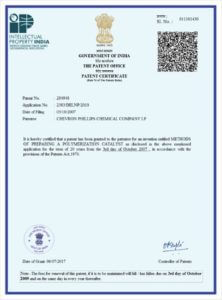What is a Patent? : the definition
A patent is a government-granted right that gives exclusive ownership of an invention for a limited time. It allows the patentee to control who can use, make, sell, or import the invention. Obtaining a patent offers various financial advantages, such as earning royalties through licensing, building a business without competition, raising capital, or selling the patent.
Table of Contents
We will start with how patent law defines a patent.
Definition: what is patent?
“A Patent is a statutory right for an invention granted for a limited period of time to the patentee by the Government, in exchange of full disclosure of his invention for excluding others, from making, using, selling, importing the patented product or process for producing that product for those purposes without his consent.”
in other words;
“A patent can be defined as a grant of exclusive rights to an inventor over his invention for a limited period of time (generally 20 years from the date of filing of patent application). The exclusive rights are the right to exclude others from making, using, selling, importing, or offering for sale his patented invention without his permission.”
This implies when you get a patent for your innovative idea, the government gives you a monopolistic right for your invention to stop others from making, using, selling, importing, or offering for sale your patented invention without your permission.
What this means in financial terms is you would get significant monetary benefits for your patented invention by:
- licensing your patented invention to other business and earn royalties on regular basis as per the agreement
- you can build a business around your patented invention and stop others from copying it, so there would be no one competing with you with similar product or service, and hence can earn significant profits.
- having a patent for your invention may also help in raising capital for business
- you can transfer all rights of the patented invention to other businesses. that is, you can make significant money by selling your patented invention.
Are patents worth it? deciding whether to file or not?
There are 2 ways to look at worth of patent:
Direct benefits of patent : this is when you have direct and measurable benefits contributing to the worth of patent like
- cost of selling patent
- royalties on licensing or
- damages claimed after infringement etc.
Indirect benefits of patent : this is when you have indirect benefits that are contributing to the worth of patent when
- Competitor does not copy your invention
- You could sell patented invention at decent profits because of no direct competition
- You or your firm is considered an expert of the industry
- You can raise money due to granted patent
- You can mortgage or take loan on granted patent
- It strengthens your resume
- It can earn you promotions, praises and recognition etc…
while deciding whether to file or not to file patent application, if the granted patent for your invention achieves atleast one of the points mentioned above which is valubale to you.
example 1: if you are a student and by getting patent you would be happy to receive the recognition, stethening of your resume and getting better job opportunity due to the patent then it would be worth the investment for you.
example 2: having patent for a product of your company helps you establish yourself as an expert in the industry or help increase the value of the firm in eyes of investors or buyers then investing in patent would be worth for your firm.
Generally, it depends on the purpose you wish to achieve by patent, that helps you decide whether it would be worth the investment or not.
Advantages of a patent for your invention
Owning an intellectual property has some similarities with owning any other form of tangible property like a real estate. So, what are the advantages of having a real estate property on your name?
- You can rent it
- You can sell it
- You can stop others from using the real estate without your permission
- You can use the real estate for your purpose (business or residence)
on similar terms, the patent is an intellectual property and has all the advantages stated above, but you need to claim it to be on your name, hence it is important to file of a patent application for your invention. and there is a difference though, unlike real estate the patent has the term of 20 years of ownership.

- You own exclusive rights for patented invention for a given time (20 years from the filing of patent application)
- You can use it to build a business around patented invention and not worry about competition
- You can rent it (in this case license the patented invention) to existing businesses
- Exclude others for using, selling, offering for sale, and importing your patented invention in India
- You can completely sell the patent to other company
hence this gives a unique advantage to the patent owners which can be leveraged to have a complete monopoly and competitive advantage from the competition and in certain cases having patent may also help in raising capital for business !!!
Imagine what it would be like when:
- You have exclusive rights for your invention (idea, project, product, etc.) and you can stop others from using your invention for commercial purposes for 20 years from the filing date.
- You can make a significant return on your investments that you made for research and development and patenting your invention by ways like
- licensing your patent to other companies,
- building business around your invention, or
- completely selling it to other companies.
- You will have better chances of getting funding for your idea, business, product, etc. If it is protected by patents, investors clearly see how they can have a monopoly in the market by having a patented product for the business.
- You and your business are perceived as an expert in the industry when you have a patent. This helps in finding great employees, partners, financiers, and clients too.
Ultimately it enhances your market value.
Most people believe that, Patents are given to only groundbreaking (landmark) and complex invention that changes the world, which is not true !!!
In reality, patents are also granted to incremental inventions !!! Inventions that have a novel solution to a technical problem, may that problem be small (but significant to form an inventive step and clear non-obviousness test).
What that means is, most of the part of your solution may be already known to the public (that is available in the market, patented or published in journals) but you might have come up with something (an inventive step) that is not an obvious solution to a normal person skilled in that domain and solve a very small problem in existing solutions. In this such case, the inventor still can win a patent for his invention if other patentability criteria’s are mate by his invention
Many inventors getting discouraged by seeing something similar to their invention in the market, published or known to the public… what they fail to realize is they may still have novelty and inventive step in their invention although apparently, it looks similar to things already known to the public.
Don’t get discouraged if you see things already in the market, published or known to the public which are somewhat similar to your invention… You still may have something in your invention that can win a patent.
This is beautifully explained in our section on the “Step 1 : from idea to invention disclosure”.
